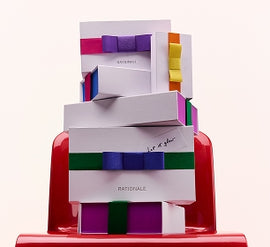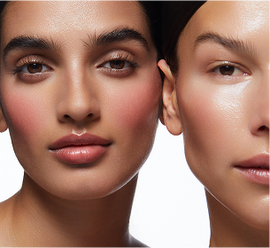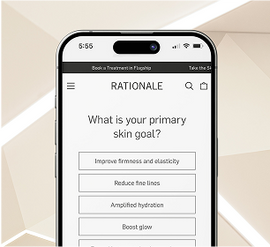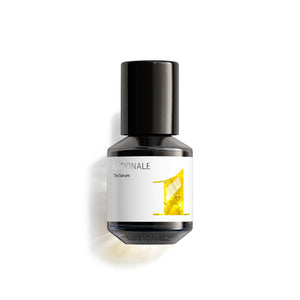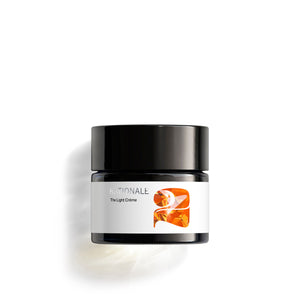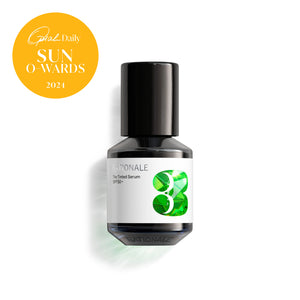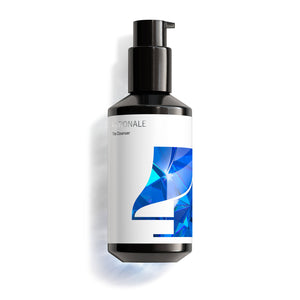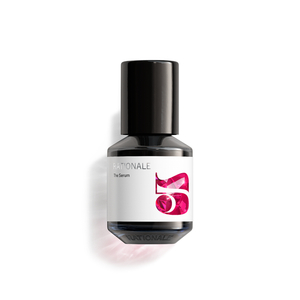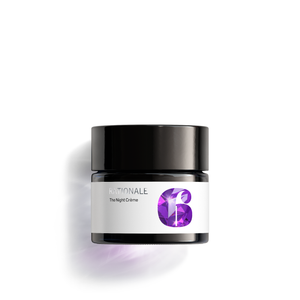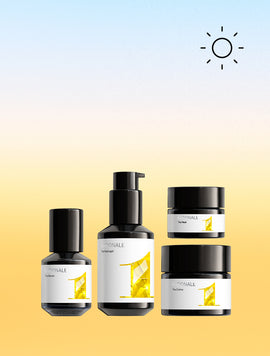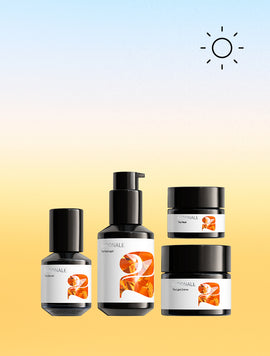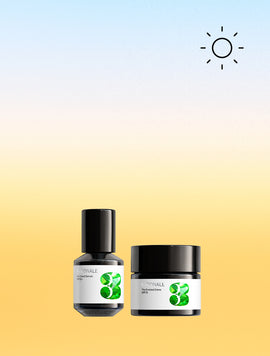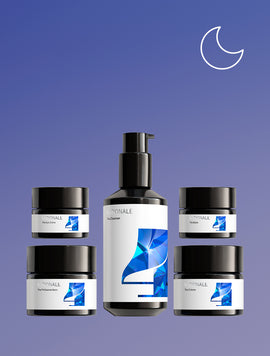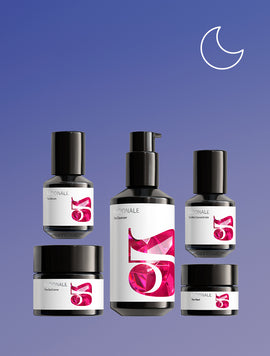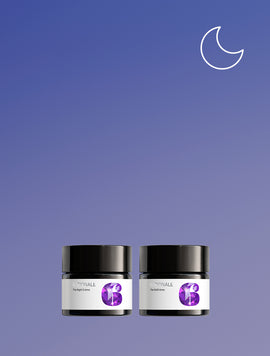RATIONALE Luminary
Perspective—it’s a central concept for Hannah Hollis, and one that has shaped both her personal and professional life. A woman of broad talents and even broader insights, Hollis has cultivated a career as a renowned TV host, journalist, and newsreader. Beyond her professional accomplishments, it’s Hollis’ cultural background and lived experience that have shaped her present-day perspective.
“I’m proudly of Aboriginal descent with Australian and European heritage, so I’ve grown up in a mixed-race family and with that comes a unique perspective,” says Hollis. With age, Hollis has recognised just how influential her earliest, formative years have been. “Integrity, tolerance, understanding, and kindness were pillars of my childhood,” she says. Now, all grown up and recently married, Hollis acknowledges that having an open mind is central to understanding—and celebrating—others’ perspectives. “Life is too short and too grey without the vibrancy of experience that our differences colour in.”
We sat down with Hollis, a long-time RATIONALE Luminary, to gain an insight into her day-to-day world, and the experiences that have shaped her worldview.
You’re quite the multi-hyphenate. How would you describe your job?
I’m a journalist, host, newsreader, field producer, snack provider, part-time weather watcher and, perhaps most importantly, a hot chip enthusiast at stadiums across the country.
How did you first get started in the industry? Was journalism something you always wanted to pursue or was there something else you saw yourself doing when you were younger?
When I was nine years old, my younger brother and I got guinea pigs as pets and I used to interview them, pretending I was on the news. My pop would film me on his hand-held camcorder—remember those? I never wanted to do anything else, and, because of that, I didn't have a ‘plan B.’ It was immense motivation.
Congratulations on your recent appointment as the face of Netball for Fox Sports, in addition to the NRL. What has the response been?
I’m thrilled to be working on the Netball, we have an exceptional and enthusiastic team working hard to bring a special Super Netball season to everyone. I’ve received such wonderful outreach from netball fans, welcoming me and I’ve particularly been taken by the women and girls getting in touch to share their stories, passion for the game, and the importance of team sport for all. My workload has doubled but I’ve never been busier or happier in my life.
What does a ‘typical’ workday look like working in the sports world?
Most of my on-air work takes shape in three ways: hosting game day broadcasts in-studio, running the sidelines at games reporting on the latest news and injuries, or filming feature stories with players that are shared across the network. Each of those roles requires a slightly different tone, identity and skill set, but are intoxicating and rewarding in equal parts.
No two days at work are ever the same. I love the unexpected variety that it brings. Once a game is underway, you never know how it’s going to unfold. We might have the statistics, the experts, and insights of seasoned professionals on hand but when the whistle blows, we’re watching live just like our audience and reacting, in real-time, to what’s happening on the field. It’s a genuine and authentic relatability that only live sport can bring. You live the highs, the lows, and the painstakingly nail-biting moments in between.
My favourite time is when we host our coverage from a game or I’m working sideline because that’s when I’m closest to the action. I sit next to or behind a team bench and it puts me in a position to hear the coach calling out plays, teammates hyping each other up, or in the unfortunate event that a player comes off injured, I can usually hear the early conversation of diagnosis with team doctors which I then consider to craft into breaking news for our half-time show.
What does being a journalist and presenter mean to you?
In the moments before a broadcast, I remind myself that, at the core of what we’re about to do, is entertain our audience. [They] actively invite us into their lounge rooms each week and, no matter what’s happening in their world, they’re choosing to connect with us. So, [it’s important to] make it count.
Philosophically speaking, it’s our mutual love of footy that lays the strong foundation from which healthy discussion—through a varied lens of worldviews—can flourish. And perhaps create true change in the pursuit of social cohesion. We know sport is the best vehicle for that and to be on the frontline of a tiny part of change is rewarding.
Is there a standout in your career so far? A moment of brilliance that you’re particularly proud of?
Different moments stand out for different reasons, but I’ll never forget the first time I experienced live TV or when news is breaking and you’re the one to deliver it to the audience.
I flew to a remote Indigenous community in the Northern Territory to do a story on a morgue power failure that led to a wrongful burial of an Aboriginal man, who was taken off his country and placed elsewhere, only to be unburied. It was just horrible for the all the families involved.
At the time I was a video journalist, a sole operator, which meant I would do my own filming, my own audio, find the good light, make my talent feel comfortable and, at times, I had to be my own security. And, of course, I was the one to ask the questions. These days, I’m lucky to work with experts in their fields and I can focus on my single job, but I think that time in my career stands out because it was a wild time of adventure and opportunity. I learned so much about myself, the privileged position, and responsibility of the job. There’s still so much I’d like to do in my career, and I think my best working days are still ahead of me.
Outside of work, is there a hobby or interest that you love to make time for? Perhaps something that people don’t know about you?
My husband and I love adventure, so we prioritise finding time to do things that give us a thrill. Hiking mountains, jumping out of planes, going on safari, and sleeping under the stars have been terrifyingly fabulous memories that we’re looking to make more time for now that the pandemic seems to be behind us.
Where do you currently reside? Where have you called home in the past?
This month marks my 10th anniversary calling Sydney home. I live in Bondi with my husband, but I lived in many places before putting roots down in this beautiful city.
I was born in Darwin and grew up in Canberra before we moved to Port Moresby, Papua New Guinea, where I spent a few years at high school. I went to boarding school in Melbourne and then studied Journalism at RMIT. I was lucky enough to secure a cadetship with SBS and made the move to Sydney in early 2012. I had every intention of returning to Melbourne after a year but, a decade later, I’m still here and there’s no place I’d rather be. It’s home.
What do you love about living in Bondi?
We’re only a short walk to the beach. That, single-handedly, is the best part of living in this neighbourhood. I now religiously subscribe to the idea that saltwater can cure-all.
Who, or what, do you think has had the biggest influence on the person you are today?
I draw my biggest inspiration from my husband, my family, and my inner circle of friends. I’m so proud of the tribe I’ve surrounded myself with and within each of them are qualities that I deeply admire, so I try to emulate that as much as possible.
Has there been a challenge or obstacle that you’ve had to work hard to overcome?
I think we’re always facing challenges and navigating our way around, or through, them. Some are tougher than others. A few years ago, we were filming a live show and one of our crew on the floor had a heart attack. I wasn’t quite sure what was happening and I remember a call coming through my earpiece saying get to the break, so I did.
It was really frightening and, fortunately, he was okay. We took a 15-minute commercial break to get the ambulance into the studio and out again. When we came back on the air, we had to continue as if nothing happened.
I was under immense pressure and I learned that I was stronger than I thought. My experience pales in comparison to what that man was going through. It feels somewhat insignificant. [After] being dropped in the deep end, in the early days of my career, and keeping it together, I left feeling like there’s not much else that could come my way, that I wouldn't be able to handle.
Tell us about your attitude to beauty and self-care. Growing up, did anyone’s outlook on beauty influence your own?
I like to keep my approach to beauty simple and effective. I’m dedicated to using high-quality and purpose-built products that work hard for me. While facials are special treats for most of us, I subscribe to the philosophy it’s what we do every day that counts most, so invest there.
I used to love watching my mum put her makeup on before going to work. She’s effortlessly beautiful and as she’d be applying her blush, she’d pass on pearls of wisdom that have stayed with me: don’t pluck your eyebrows, don’t dye your hair, and when you’re getting dressed for the day, leave something to the imagination. She was, and still is, one classy woman.
And what does self-care mean for you now?
As our lives pick up again after the pandemic, I think self-care takes shape in whatever way we need it to. I love curling up the couch on my own with a cup of tea and #1 The Mask, tuning into an old episode of Friends or Sex and the City. On a more regular basis, I spend a lot of time in the car and nothing beats calling a girlfriend for a good laugh. Queue: the dopamine release. A trusty backup is the salt cure: a dip in the ocean, a good cry, or some hot chips often do the trick.
Take us through your morning and evening routine.
I always try to begin the day with exercise and finish it with a nutritious meal and scented candles. If I can open and close the day with something that sparks joy, whatever madness is thrown my way in the middle doesn't seem to matter.
In terms of my RATIONALE routine, in the morning I use #4 The Cleanser, #1 The Serum, #2 The Serum, #5 The GelCrème and finish with the ridiculously addictive #3 The Tinted Serum SPF50+. My skin devours all the goodness of the zinc and when I’m not working, I don’t even need to wear makeup.
At night, particularly after work, I need a bit more elbow grease to take off the TV makeup. Stepping up to the plate is #4 The PreCleanse Balm, a double-cleanse with #4 The Cleanser and #5 The Cleanser, into #5 The Serum and #6 The Night Crème. I’m old enough to know that I need #6 The Eye Crème, so I pop that on. I advocate to all of my girlfriends that this is the next frontier of our skincare. They laugh mostly, but they’ll thank me later.
How long have you been with RATIONALE and how did you learn about the Brand?
I discovered RATIONALE through a girlfriend of mine about four years ago—and I have been all-in ever since.
One day, my mother-in-law spotted the familiar glass bottles in our bathroom, and it turns out she’s been a RATIONALE devotee since the beginning. In a testament to the longevity of the brand, Sue has been using the formulations for more than 20 years. I call her a RATIONALE OG and I love that it’s become a mutual love of ours in a generational success story.
What are you currently watching, listening to, and reading?
I’m loving the new season of Succession on Foxtel and Yellowstone. Ed Sheeran’s and Adele’s new work has been on repeat and I’m currently reading a book called The Resilience Shield which I’ve found particularly insightful. It’s written by three SAS veterans weaving their elite experience as soldiers with modern thinking and wellbeing. I’ve dog-eared several pages already that I’ll come back to.
Is there an approach to life that you live by?
I’m proudly of Aboriginal descent with Australian and European heritage, so I’ve grown up in a mixed-race family and with that comes a unique perspective.
At school, my brother and I would learn about Captain Cook discovering Australia and we’d go home where Mum and Dad would explain the other side of European settlement, the atrocities facing the Indigenous people, and issues like The Stolen Generation. Years later, when we lived in Port Moresby—a third world but a beautiful country—I was exposed to customs, cultures, family dynamics and, to put it directly, an entirely different lifestyle from the one I was living in suburban Canberra.
With age, I’ve realised how lucky I was [to have] that lived experience. Integrity, tolerance, understanding, and kindness were pillars of my childhood. In my family, the differences in us and those we met were celebrated, not condemned. At the time, I didn’t think anything of it. It wasn’t a conscious effort; it’s just the way it was.
With an open mind, there can be so much good that comes from our varied lenses. Life is too short and too grey without the vibrancy of experience that our differences colour in. Racial bias and prejudice are learned behaviours that stunt our personal growth, and our lives would be far richer without them.
When something doesn’t line up with what you think is right, it doesn’t make it wrong, it’s just different. But for some, there can be discomfort in that difference, and they may reject it entirely which leads to unconscious bias over time. There’s such an opportunity to flip the script and that’s where kindness, genuine curiosity and open-mindedness come in.
What do you look forward to? What fills your cup?
The pandemic forced a huge reset for all of us and I’ve enjoyed a simpler, slower pace. I remind myself that when we strip back all the ‘stuff’, what's left is the most important: family.
My husband and I got married just before the pandemic began so we’re particularly excited for the future and the magic that life has in store for us. The best days are still to come and after everything we’ve all endured, I think that’s a bloody great place to be.
Photography: Jason Ierace
Production: Chee Productions
